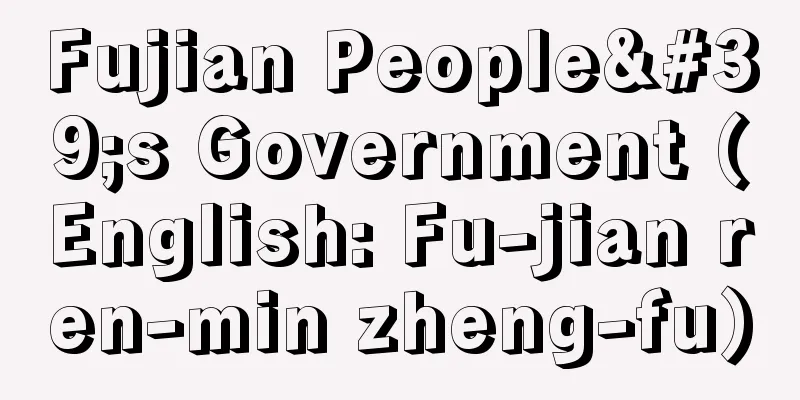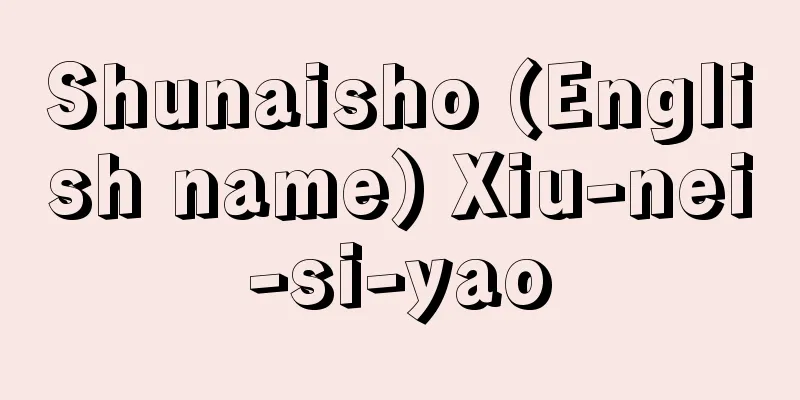Fujian People's Government (English: Fu-jian ren-min zheng-fu)

|
A government established in Fuzhou, Fujian Province, from November 1933 to January 1934, with an anti-Japanese and anti-Chiang slogan. Its official name was the People's Revolutionary Government of the Republic of China. The 19th Route Army, which had actively fought against the Japanese during the First Shanghai Incident in 1932, had a strong desire to resist Japan, and Chiang Kai-shek ordered the 19th Route Army to move from Shanghai to Fujian Province to avoid clashes with the Japanese army and to suppress the Red Army. However, the 19th Route Army commanders Cai Tingkai and Jiang Guangyu gathered together anti-Chiang military and politicians from various parties and factions, including Li Jichen and Chen Mingshu from the Guangxi faction and Huang Qixiang from the third party, and held the "National People's Provisional Congress of China" in Fuzhou on November 20, 1933, and adopted the Declaration of People's Rights. On the 21st, Cai, Jiang, Li, Chen and others sent telegrams to various places announcing their departure from the Kuomintang, and on the 22nd, the Fujian People's Government was established, and the 19th Route Army was renamed the "People's Revolutionary Army." Li Jichen was chairman of the Government Committee, Chen Mingshu was chairman of the Cultural Committee, Jiang Guangya was chairman of the Economic Committee, and Cai Tingkai was chairman of the Military Committee, and other people from social democrats to nationalists who were anti-Japanese and anti-Chiang participated. On October 26th, before the government was established, a preliminary anti-Japanese and anti-Chiang agreement had already been signed between the 19th Route Army and the Chinese Communist Party (the Provisional Government of the Chinese Soviet Republic and the Red Army), and an agreement on ceasefire and cooperation between the two sides had been established. However, the Communist Party led by Chen Shaoyu and others did not support the Fujian People's Government due to its ultra-leftist policies and immaturity. On January 1, 1934, the Nationalist government forces launched an all-out attack, and on January 13, the Fujian People's Government collapsed. Source: Encyclopaedia Britannica Concise Encyclopedia About Encyclopaedia Britannica Concise Encyclopedia Information |
|
1933年 11月~34年1月,反日反蒋を標榜して福建省福州に樹立された政府。正式名称は中華共和国人民革命政府。 32年の第1次上海事変の際に日本軍と積極的に戦った十九路軍は抗日意欲が強く,蒋介石は日本軍との衝突を避けるため十九路軍を上海から福建省に移駐させ,紅軍討伐を命じた。しかし,蔡廷かい,蒋光 鼐らの十九路軍将領は,広西派の李済 琛,陳銘枢,第三党の黄き翔ら各党各派の反蒋派軍人,政治家らを結集して,33年 11月 20日福州で「中国全国人民臨時代表大会」を開き,人民権利宣言を採択。 21日蔡,蒋,李,陳らは国民党からの脱党の電報を各地に発し,22日福建人民政府が成立し,十九路軍を「人民革命軍」と改称した。李済 琛が政府委員会主席,陳銘枢が文化委員会主席,蒋光 鼐が経済委員会主席,蔡廷かいが軍事委員会主席となり,その他社会民主主義者から国家主義者まで反日反蒋の立場に立つ雑多な人々が参加した。この政府樹立前の 10月 26日に,すでに十九路軍側と中国共産党側 (中華ソビエト共和国臨時政府と紅軍) との間に反日反蒋初歩協定が結ばれ,両者の停戦,協力に関する取決めが成立していた。しかし,陳紹禹らに指導されていた共産党はその極左的方針と未熟さのために,福建人民政府を援助しなかった。 34年1月1日国民政府軍は総攻撃を開始し,1月 13日福建人民政府は崩壊した。
出典 ブリタニカ国際大百科事典 小項目事典ブリタニカ国際大百科事典 小項目事典について 情報 |
<<: Real rights claim - real rights claim
Recommend
Sogdiana - Sogdiana (English spelling)
This is the ancient name for the area centered on...
Legislative state - Rippo kokka
Modern post-revolution states are based on the pre...
Oppression - Danatsu
[noun] ① To trample underfoot. To suppress. To cru...
Diving - Sensui (English spelling)
Diving refers to a human being diving underwater,...
American Renaissance
…He paid close attention to the form of expressio...
Toa Domestic Airlines
...It was founded in 1952 and 1953 as local airli...
FAA - Federal Aviation Administration
Federal Aviation Administration : A division of th...
Xuzhou Operation
From April 7 to May 19, 1938, the Japanese army pi...
Izu-Ogasawara Trench - Izu-Ogasawara Trench
The Izu-Ogasawara Trench is approximately 850 km l...
Overflow urinary incontinence
bladder Bladder A condition in which a large amou...
Atriplex hortensis (English spelling)
…[Tetsuichi Yahara]. … *Some of the terminology t...
Viktor Mikhailovich Vasnetsov
1848‐1926 Russian painter. Born into a priest'...
Campbell, C.
…After returning from Italy in 1719, he designed ...
Transhumance people - Ibokumin
…Of course, the distance traveled varies from reg...
Ferdinand [II] - Ferdinand
King of Aragon (reigned 1479-1516). He married Pri...









